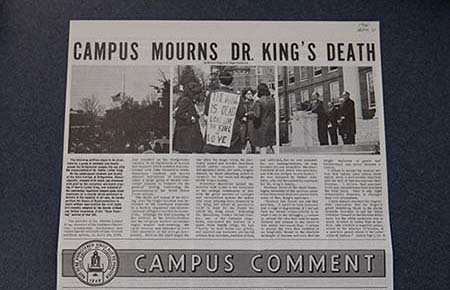
On April 5, 1968, Bridgewater State College was in mourning.
The day before, devastating news reached campus that Dr. Martin Luther King Jr. was dead. The civil rights leader had been shot and killed in Memphis, Tennessee.
Bridgewater classes were canceled and the mood was somber. According to the April 11, 1968 issue of the student newspaper, Campus Comment, more than 1,500 members of the campus community gathered at the school’s quadrangle to attend a memorial service in King’s honor.
The civil rights leader’s murder also inspired a group of faculty and students to create a petition asking the Massachusetts House of Representatives to enact the senate’s recently adopted civil right bill.
It was a time of unrest both on campus and beyond.
The day King was killed, pockets of riots erupted in Boston neighborhoods with angry protestors destroying and looting businesses. Amid safety concerns, Boston public schools opted to cut classes short.
Sydne Marrow (pictured above), director of Multicultural Affairs at BSU, was in the fourth grade at the time and recalls being lined up with her classmates as teachers scrambled.
“I was pulled aside and told my mother was coming to get me. Frantic, I said no, my mother doesn’t come to get me, I need to get my sister and walk home,” she said.
That’s when it was explained that King had been assassinated.
Marrow’s initial 9-year-old thought was, “‘What does this have to do with me?’ I didn’t know who he was. I had heard of him but didn’t understand the importance of his leadership.”
After King’s death the riots raged on and Marrow was no longer allowed to walk to school or take the train by herself to attend dance class.
“I remember very vividly my world being turned upside down. I lost my freedom to go on the train and where I wanted to go,” she said. “You never knew what was going to happen from one day to the next. Some days it was quiet, other days there were fires and it was all over the news.”
For many years, Bridgewater State has celebrated the Martin Luther King Jr. holiday in a variety of ways and with different types of service initiatives. This year, the university’s Community Service Center will host a community lunch and participate in a mural painting at Brockton’s Old Colony YMCA. See futher details and registration information for Monday’s event.
Upon returning home from his job as a supermarket cashier, then-17-year-old Bruce Wayne Gaines, ’73, learned of the assassination from his parents.
The tragedy ended up altering the course of his life.
At the time of the civil rights leader’s murder many higher education institutions sought to diversify undergraduate enrollment. In response, Bridgewater established PROGRESS, or the Program for Recruitment and Retention of Special Students, administered by Paul L. Gaines, the school’s first black administrator.
A “Martin Luther King Jr. Action Committee” was also formed. Its goals included creating programs to help African-American students succeed at Bridgewater.
“Without turmoil in the aftermath of Dr. King’s assassination and institutional reactions to it, I probably would not have considered Bridgewater State College. I had planned to attend the University of Rhode Island,” Bruce Gaines said. “Dr. King’s death did not end his dream but created energy and opportunity to empower me and millions of college students.”
Alumna Jeanne O. Foster, ’77, agreed.
“His death created a social conscience awakening among some white Americans in leadership positions and my generation was the first to benefit,” she said.
Foster was only 13 when King was assassinated, but it’s a day she will forever remember.
“We were not prepared as a people to lose him. There was no other voice in America that gave us hope and captured the hearts and minds of black people in the United States and the people of other races who supported us,” she said.
When King was killed, Bridgewater State’s first president of color, Dr. Dana Mohler-Faria was serving in the U.S. Air Force, stationed at Ellsworth Air Force Base in Rapid City, South Dakota.
“It was a time of deep racial divide and the reactions to Dr. King’s assassination were mixed,” he said.
The overall sense was, the march toward American justice would continue despite King’s death, Mohler-Faria said.
“It left many of us with a sense of great loss, and at the same time a drive to continue the important work to bring justice and healing to all Americans,” he said. “His legacy continues and much of the progress can be attributed to his vision and commitment to justice.”
Marrow often wonders what the world would look like today if King’s life hadn’t been cut short, particularly at a time when, at the national level, the country feels so politically polarized.
“I’d like to think if he continued his work we wouldn’t be in the situation we are in right now, because his message was one of peace and love across the lines. I would like to think he could have continued to gain people’s trust and allegiance, making allies with even more white leaders at that time who were realizing black people aren’t the enemy,” Marrow said. “He wasn’t a race person, he was looking for a kinder world.”
Do you have a BSU story you'd like to share? Email stories@bridgew.edu.

